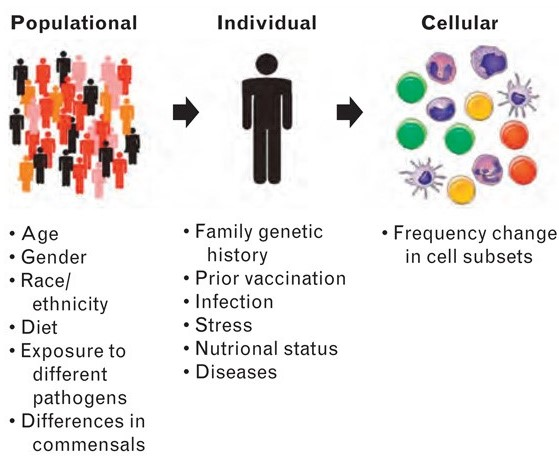Systems vaccinology: its promise and challenge for HIV vaccine development.
The use of systems biology approaches to understand and predict vaccine-induced immunity promises to revolutionize vaccinology. For centuries vaccines were developed empirically, with very little understanding of the mechanisms by which they mediate protective immunity. The so-called systems vaccinology approach employs high-throughput technologies (e.g. microarrays, RNA-seq and mass spectrometry-based proteomics and metabolomics) and computational modeling to describe the complex interactions between all the parts of immune system, with a view to elucidating new biological rules capable of predicting the behavior of the system. Systems biology successfully applied to yellow-fever and influenza vaccines has led to the discovery of signatures that predict vaccine immunogenicity, and promises to advance basic immunology research by providing novel mechanistic insights about immune regulation. However a major challenge of systems vaccinology concerns the analyses and interpretation of the large and noisy data sets generated by high-throughput techniques. Overcoming these issues, we envision that systems vaccinology will have a potential impact on vaccine development, including HIV vaccines. High-throughput technologies allow the investigation of vaccine-induced immune responses at system and molecular levels. These are currently being used to unravel new molecular insights about the immune system, and are on the verge of being integrated into clinical trials to enable rational vaccine design and development.
Publication Year
Publication Journal
Associeted Project
Systems Vaccinology
Lista de serviços
-
RASL11A, member of a novel small monomeric GTPase gene family, is down-regulated in prostate tumors.RASL11A, member of a novel small monomeric GTPase gene family, is down-regulated in prostate tumors.
-
Splice variants of TLE family genes and up-regulation of a TLE3 isoform in prostate tumors.Splice variants of TLE family genes and up-regulation of a TLE3 isoform in prostate tumors.
-
Concepts on Microarray Design for Genome and Transcriptome AnalysesConcepts on Microarray Design for Genome and Transcriptome Analyses
-
The iron stimulon of Xylella fastidiosa includes genes for type IV pilus and colicin V-like bacteriocins.The iron stimulon of Xylella fastidiosa includes genes for type IV pilus and colicin V-like bacteriocins.
-
Origins of the Xylella fastidiosa prophage-like regions and their impact in genome differentiation.Origins of the Xylella fastidiosa prophage-like regions and their impact in genome differentiation.
-
The role of prophage in plant-pathogenic bacteria.The role of prophage in plant-pathogenic bacteria.
-
Genetic control of immune response and susceptibility to infectious diseases.Genetic control of immune response and susceptibility to infectious diseases.
-
Building capacity for advances in tuberculosis research; proceedings of the third RePORT international meeting.Building capacity for advances in tuberculosis research; proceedings of the third RePORT international meeting.
-
São Paulo School of Advanced Sciences on Vaccines: an overview.São Paulo School of Advanced Sciences on Vaccines: an overview.
-
A reasonable request for true data sharing.A reasonable request for true data sharing.

